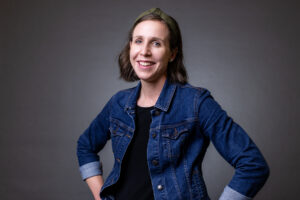
Sign up for a new account.
And get access to
The latest T1D content
Research that matters
Our daily questions
Sign up by entering your info below.
Reset Your Password
Don't worry.
We will email you instructions to reset your
password.
Whitney Beaton, MSN, RN, AACNS-P, CDCES is a pediatric diabetes clinical nurse specialist at the University of Wisconsin Health Kids inpatient and outpatient programs. In conjunction with the clinical pediatric diabetes team at UW Health Kids, Beaton has been a member of the T1DX-QI since 2021, driving patient care and outcomes forward through quality improvement initiatives.
Beaton received her Master of Science in Nursing degree from the University of Missouri in Columbia, Missouri. She is board-certified as a pediatric clinical nurse specialist and is a certified diabetes care and education specialist.
Interview with Whitney Beaton, MSN, RN, AACNS-P, CDCES

In this interview, Beaton discusses her expertise in supporting people with type 1 diabetes (T1D) and working to improve patient care through the T1D Exchange Quality Improvement Collaborative (T1DX-QI).
The T1DX-QI was established in 2016 — with the support of The Leona M. and Harry B. Helmsley Charitable Trust — in an effort to refine best practices and improve daily life for people with type 1 diabetes (T1D). Growth has been tremendous, with 54 endocrine clinics from across the U.S. participating in the Collaborative.
Fueled by top leaders in diabetes care, the T1DX-QI has become an engine of innovation and inspiration. By engaging with the shared, data-driven, and systematic methods of the T1DX-QI, clinics have seen unprecedented success in their approach to diabetes management.
With members working closely together to identify gaps in care, discover and refine best practices, and share research — the process has become knowledge-sharing at its very best. While collated data gives clinics a clear sense of “where they are,” it also demonstrates “where they can be” by applying shared, evidence-based methods for improving care.
What led you to nursing and diabetes care?
“It’s pretty simple — I’ve always wanted to help people,” said Beaton who has been a registered nurse since 2009. “I fell in love with pediatrics during my clinical rotations at Children’s Mercy Hospital in Kansas City and knew it was exactly where I was meant to be.”
“There’s something about working at a children’s hospital that’s really special to me,” said Beaton. “Working with kids is wonderful. Children are so resilient. Even when they’re sick, they often find a way to play games or have fun.”
After several years of practicing nursing in a Pediatric Intensive Care Unit (PICU), Beaton decided to pursue an MSN degree. It was during graduate school clinicals when she discovered the difference quality education can make for families living with chronic diseases like T1D.
“It’s a place where nurses can really have a positive impact,” explained Beaton. In her previous years of nursing, she found it was rare to encounter mistakes made by a single person.
“Rather, it was a system problem — and I knew I could help to make system improvements, too.” That said, when determining her clinical nurse specialist certification path, Beaton chose to examine healthcare delivery in a more global picture to help improve patient care.
While her nursing career began in PICU, she shifted to the UW Health Pediatric Diabetes Clinic about six years ago. Beaton remains involved in direct patient care for hospitalized patients, but she’s usually found behind the scenes, making positive contributions and improvements in the delivery of diabetes care.
What do you enjoy most about your work?
“What I enjoy most about my clinical nurse specialist role is the diverse ways I can impact patient care through nursing education and system-level work,” said Beaton. “Be it interacting one-on-one, connecting patients with resources they need, or working with hospital and clinic nurses to implement best practices and systems-level work such as crafting policies to guide patient care.”
Through education and systems work, Beaton can indirectly cast a wider net, impacting a larger scale of patients.
UW Health and T1DX-QI
“We’re still really in awe of all of the things we can do through T1DX-QI,” said Beaton, whose quality team joined in 2021, and includes Dr. Elizabeth Mann, who serves as the primary PI, co-site coordinator Rachel Fenske, Ph.D., and Dr. Tracey Bekx, who also serves as the program director of the diabetes program.
“The Collaborative empowers us to think about attainable changes, and it’s provided an opportunity for us to develop a work group that’s focused on system improvements,” explained Beaton. “Because of the T1DX-QI, we’ve been able to incorporate processes from other centers such as EMR improvements that enable us to order CGMs more seamlessly.”
“There are many great things about the T1DX-QI — working with Ann Mungmode is one of them. Having a personal QI coach who gives us feedback and keeps us on track is incredible. She’s such an asset to our QI work,” said Beaton.
“In terms of quality improvement, increasing CGM use is the biggest project to date,” said Beaton. “In Wisconsin Medicaid coverage for CMG tends to be easier when we start early, so we’ve partnered with our inpatient diabetes care and education specialists to provide CGM education at diagnosis.”
This, in combination with streamlining the CGM ordering processes at UW Kids Health, has made what was once a cumbersome process into a more effective and efficient effort. With access to the T1DX-QI recording dashboard, the QI team at UW Health Kids can easily access, analyze, and monitor their data.
“In turn, we’ve seen an increase in our CGM use,” explained Beaton. “When we started the project, we had about 69 percent of our patients on CGM, and now we have between 78 to 80 percent of our patients on CGM.”
Diabetes in School Health (DiSH)
In 2020, Dr. Allison Pollock and Beaton started Diabetes in School Health (DiSH), a tele-mentoring program for school nurses based on the project ECHO model. This was prompted by Pollock who noticed an escalation of communication between school nurses and the diabetes clinic and felt there was a gap, and an opportunity, to provide supportive and ongoing education for nurses.
In response, Pollock implemented a survey for school nurses, discovering the majority were interested in participating, and grassroots efforts for the DiSH program began. Beaton also serves as DiSH’s project co-lead.
“DiSH offers a free, 1-hour Zoom meeting every month with continuing education credits for nurses,” explained Beaton. “We host a speaker with diabetes expertise for the first 15 minutes and follow up with an open discussion where the diabetes experts and school nurses can interact and share ideas. The didactic sessions are archived, so the content is available any time a school nurse has time to view it.”
“I love DiSH — it’s one of the best projects I get to work on. Interacting with school nurses is great. We learn from one another and make changes in our diabetes program from their valuable feedback,” said Beaton. “It’s been really well received by the school nurses in Wisconsin and Dr. Pollock has also started DiSH Washington and DiSH Montana branches as well.”
Moving forward
 “Being a part of the T1DX-QI has helped us to focus and stay invested in improvement work — while avoiding distractions from other things that also need attention,” said Beaton. “Going through the QI process in a formal way has helped to create a more defined platform for our work. While it may be attainable to identify a problem, come up with a solution, and move on — we know that that solution needs to be monitored and maintained.”
“Being a part of the T1DX-QI has helped us to focus and stay invested in improvement work — while avoiding distractions from other things that also need attention,” said Beaton. “Going through the QI process in a formal way has helped to create a more defined platform for our work. While it may be attainable to identify a problem, come up with a solution, and move on — we know that that solution needs to be monitored and maintained.”
Moving forward, Beaton has set her sights on clinic efficiency to decrease visit time length. This process will begin with patient-reported flow sheets. Also in the pipeline at UW Kids Health is T2D improvement work that’s not yet falling under the umbrella of T1DX-QI.
“Once that’s built out, we plan on joining the Collaborative’s effort,” said Beaton. For now, UW Kids Health has a work group that’s focused on increasing screening rates for kids at high risk for T2D.
Outside of work, Beaton is likely to be found enjoying family time, and exploring outdoors with her husband and two young children. She has a passion for cooking — with and without the kids — a love of running, and discovering beautiful places after relocating to Wisconsin six years ago.







